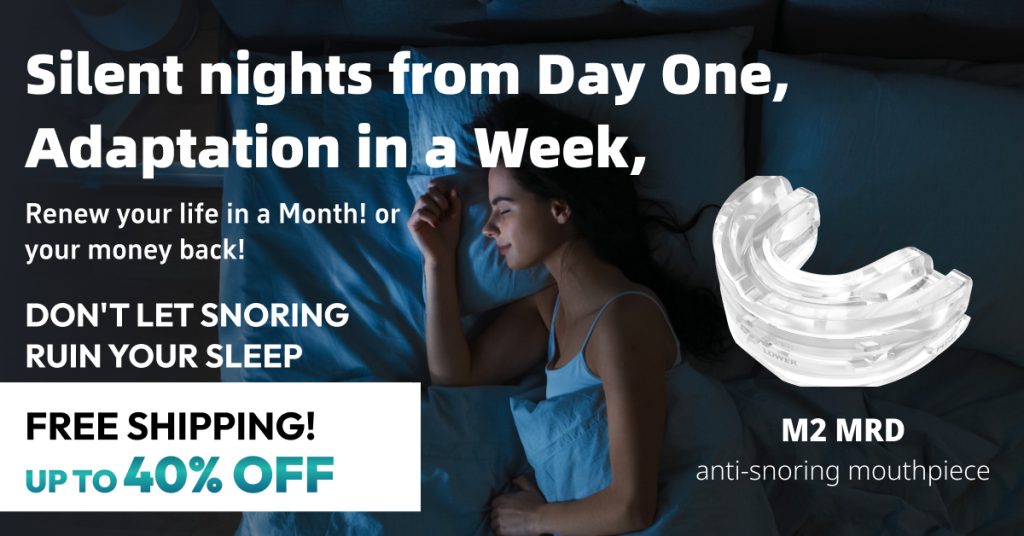
An Elegant Solution to Snoring
According to statistics, about 30% of people over the age of 30 snore, and the prevalence increases to 40% among those over 40. As people age, the likelihood of snoring increases, with half of individuals over 65 experiencing snoring. The prevalence of snoring in children is approximately 1%-3%. Among those who snore, the male-to-female ratio is about 2:1, and 2/3 of people who snore report that their spouse also snores.
The impact of snoring varies across different life stages:
- For pregnant women, snoring can lead to oxygen deprivation, which may affect fetal development, causing issues such as intrauterine growth restriction, impaired nervous system development, and even asphyxiation after birth.
- For children, snoring can result in cognitive decline, poor attention, developmental delays, and dental and jaw abnormalities (such as a receding chin and underdeveloped jaw).
- For middle-aged individuals, snoring can contribute to high blood pressure, daytime sleepiness, mood disorders (like irritability), obesity, and sexual dysfunction. Many middle-aged people may not realize that these problems are related to their snoring.
- For the elderly, snoring-related oxygen deprivation and high blood pressure significantly increase the risk of stroke and various cardiovascular diseases during sleep. In severe cases, it can even lead to sudden death, posing a serious threat to life.
Given the significant harm of snoring, it is crucial to understand what causes it:
Snoring occurs when there is an obstruction or narrowing in the airway, leading to turbulent airflow and vibrations in the airway walls, which produce sound. If the pharyngeal cavity is small, or if the upper airway is obstructed or compressed, the airflow will create sounds as it passes through, resulting in snoring.
There are two main types of snoring:
- Central Snoring: This is very rare and is typically caused by trauma or tumors affecting the head. It results from issues with the brain’s control of breathing.
- Obstructive Snoring: This is the most common type and occurs due to blockages in the nasal cavity, throat, or oral pharynx. These blockages hinder smooth airflow, leading to breathing difficulties and snoring. Conditions related to obstructive snoring include chronic rhinitis, enlarged tonsils, a high tongue position, and thickened soft palate. The vast majority of snoring cases are due to obstructions in the pharyngeal and oral pharyngeal areas.
Currently, there are three mainstream treatment methods for snoring in the medical field:
- Continuous Positive Airway Pressure (CPAP) Machine: This method is effective in managing snoring and obstructive sleep apnea by keeping the airway open with a continuous flow of air. However, it is expensive and can be inconvenient due to the need to wear a mask at night.
- Surgical Treatment: Surgical options can provide good short-term results by removing or correcting obstructions in the airway. However, surgery carries risks such as recurrence, infection, and other complications.
- Anti-Snoring Mouthpieces: These are a good alternative for those who are reluctant to use a CPAP machine or undergo surgery. They work by repositioning the jaw or tongue to keep the airway open. However, during the initial use, users may experience discomfort, a foreign body sensation, and increased saliva production.
Each of these methods has its own advantages and disadvantages, so the choice of treatment should be based on individual needs and preferences.

SLEEPON Anti-Snore Mouthpieces
Experience silent nights from day one. Adapt to your new mouthpiece in just a week, and renew your life in a month! Plus, if you’re not satisfied, we offer a money-back guarantee.
Discover more and purchase yours today at SLEEPON Anti-Snore Mouthpieces.
In addition to the primary treatments, there are several auxiliary methods that can be effective:
- Weight Loss: Excess weight, particularly around the neck, can contribute to snoring. Losing weight can reduce or eliminate snoring for some people.
- Positional Therapy: Encouraging side-sleeping rather than sleeping on the back can help reduce snoring, as it prevents the tongue and soft tissues from obstructing the airway.
- Oral Exercises: Strengthening the muscles of the mouth and throat through specific exercises can help reduce snoring by improving muscle tone and airway stability.
However, there are some less conventional treatments that are considered to be of very limited effectiveness by the medical community:
- Anti-Snoring Patches: These are designed to open nasal passages but have minimal impact on snoring.
- Anti-Snoring Sprays: These sprays may temporarily lubricate the throat but generally do not address the underlying causes of snoring.
- Anti-Snoring Nasal Dilators: These devices can help improve nasal airflow but are not effective for snoring caused by issues in the throat or mouth.
- Electrical Stimulation: This method uses electrical impulses to stimulate the muscles of the throat, but its effectiveness is limited and not widely recommended.
These less conventional methods might offer some benefit to a very small number of patients, but they are generally not recommended as primary treatments for snoring.
ALL ARTICLES
Subscribe Us
Products
Company
Copyright © SLEEPON. All rights reserved.
SLEEPON keeps both Sleeponhealth and Sleepon.us due to the brand upgrading. We promise to provide the same products and service in both sites.








Leave a Reply